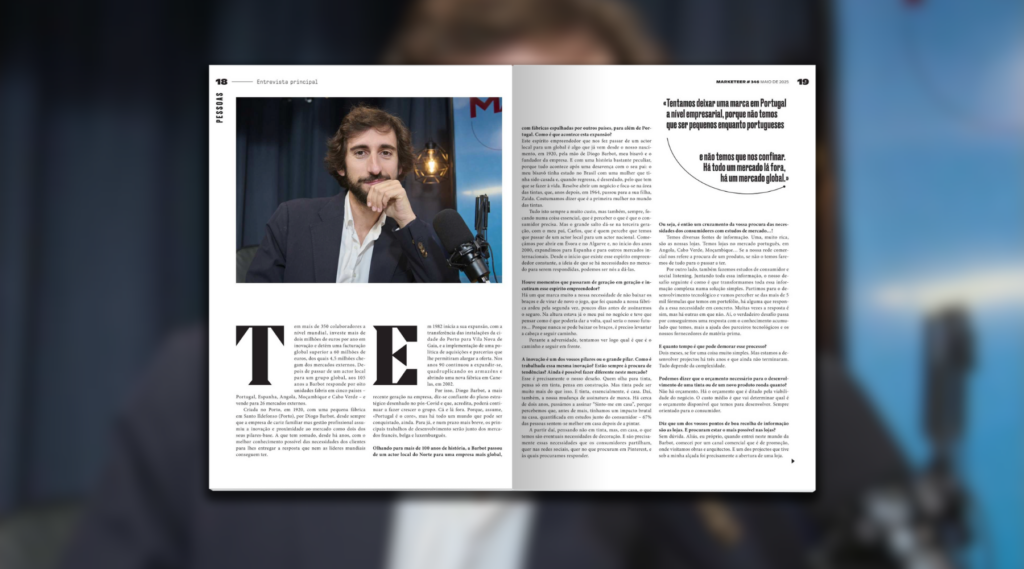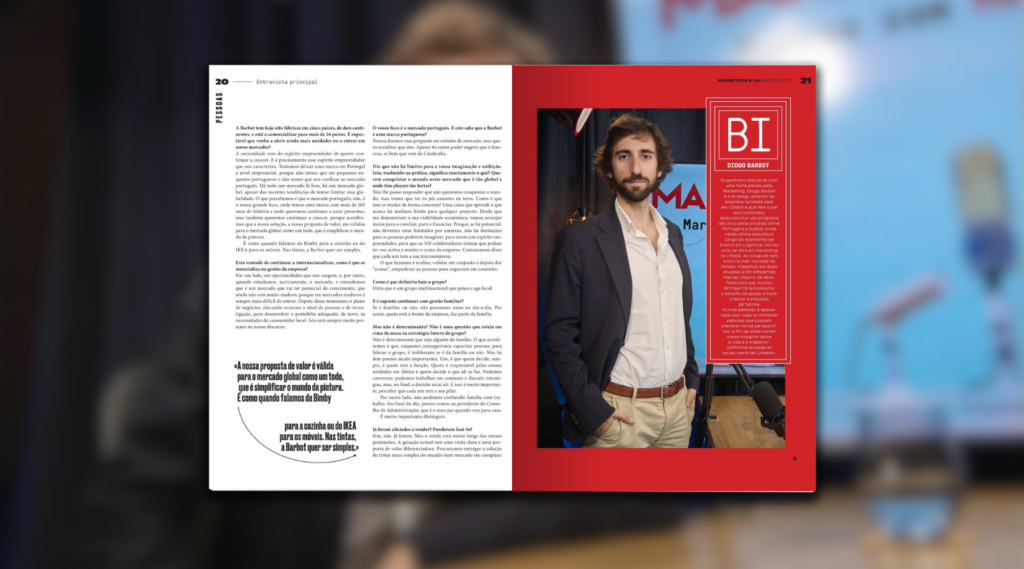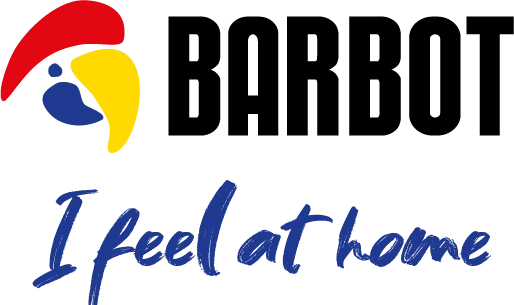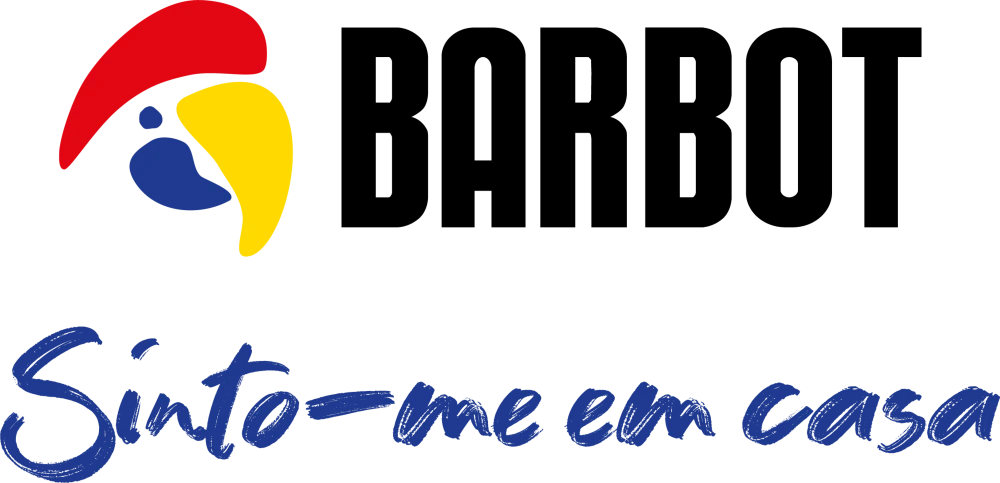At Barbot, each color tells a story and each product is born from a process that combines active listening, research and a constant desire to do better. In this exclusive interview, we open the doors of our way of thinking and working: we talk about innovation, product development, internationalization and, of course, about the entrepreneurial spirit that has driven us for more than 105 years. Discover how we turn challenges into solutions and how we continue to simplify the world of painting, without ever losing the connection to what really matters: people.

Transcription of the text of the article:
It has more than 350 employees worldwide, invests more than two million euros per year in innovation and has a global turnover of more than 60 million euros, of which 4.5 million come from foreign markets. After going from a local player to a global group, at the age of 105 Barbot accounts for eight manufacturing units in five countries — Portugal, Spain, Angola, Mozambique and Cape Verde — and sells to 26 foreign markets.
Created in Porto, in 1920, with a small factory in Santo Ildefonso (Porto), by Diogo Barbot, the family-run but professionally managed company has always assumed innovation and proximity to the market as two of its basic pillars. To which it has added, for years, with the best possible knowledge of the needs of customers to deliver the answer that not even world leaders can have.
In 1982 it began its expansion, with the transfer of the facilities from the city of Porto to Vila Nova de Gaia, and the implementation of a policy of acquisitions and partnerships that allowed it to expand the offer. In the 90s it continued to expand, quadrupling the warehouses and opening a new factory in Canelas in 2002.
Therefore, Diogo Barbot, the most recent generation in the company, says he is confident in the strategic plan designed in the post-Covid period and that, he believes, he will be able to continue to grow the group. Here and abroad. Because, he assumes, «Portugal is the core», but there is a whole world that can still be conquered. For now, and in the shorter term, the main development works will be in the French, Belgian and Luxembourg markets.
Looking back at more than 100 years of history, Barbot has gone from a local player in the North to a more global company, with factories spread across other countries, in addition to Portugal. How does this expansion happen?
This entrepreneurial spirit that made us go from a local to a global player is something that has been going on since our birth, in 1920, by the hand of Diogo Barbot, my great-grandfather and the founder of the company. And with a very peculiar story, because everything happens after a disagreement with his father: my great-grandfather had been in Brazil with a woman who had been married and, when he returns, he is disinherited, so he has to make a living. He decides to open a business and focuses on the area of paints, which, years later, in 1964, he passed on to his daughter, Zaida. We often say that she is the first woman in the world of paints.
All this always at a great cost, but also, always, focusing on an essential thing, which is to understand what the consumer needs. But the big leap takes place in the third generation, with my father, Carlos, who is the one who understands that we have to go from a local actor to a national actor. We started by opening in Évora and the Algarve and, in the early 2000s, we expanded to Spain and other international markets. From the beginning, there has been this constant entrepreneurial spirit, the idea that if there are needs in the market to be answered, we can be the ones to give them.
Were there moments that passed from generation to generation and instilled this entrepreneurial spirit?
There is one that marks our need not to give up and to turn the tables again, which was when our factory burned down for the second time, a few days before we signed the insurance. At the time my father was already in the business and had to think about how he could turn it around, what our future would be… Because you can never give up, you have to raise your head and go on your way.
In the face of adversity, we try to see right away what the path is and move forward.
Innovation is one of your pillars or the great pillar. How is this same innovation worked? Are you always looking for trends? Is it still possible to do differently in this market?
That is precisely our challenge. Whoever looks at paint, thinks only of paint, thinks of construction. But ink can be much more than that. And paint, essentially, is home. Hence, also, our change of brand signature. About two years ago, we started signing “I feel at home”, because we realized that, first of all, we had a brutal impact on the home, quantified in consumer studies — 67% of people feel better at home after painting it.
From there, thinking not about paint, but at home, what we have are eventual decoration needs. And it is precisely these needs that consumers share, both on social networks and in what they are looking for on Pinterest, and to which we seek to respond.

In other words, it is then a cross of your search for consumer needs with market studies…!
We have several sources of information. One, very rich, are our stores. We have stores in the Portuguese market, in Angola, Cape Verde, Mozambique… If our sales network tells us to demand a product, if we don’t have it, we will do everything to have it.
On the other hand, we also do consumer studies and social listening. Putting all that information together, our next challenge is how do we turn all that complex information into a simple solution. We set out to develop technology and we will see if, of the more than 5 thousand formulas we have in our portfolio, there is any that responds to this specific need. Often the answer is yes, but there are others where it is not. There, the real challenge is to get an answer with the accumulated knowledge we have, plus the help of technological partners and our raw material suppliers.
And how long can this process take?
Two months, if it’s a very simple thing. But we have been developing projects for three years and they have not yet ended. It all depends on the complexity.
Can we say that the budget required for the development of a paint or a new product is around how much?
There is no budget. There is the budget that is dictated by the viability of the business. The average cost is what will determine what is the available budget we have to develop. Always consumer-oriented.
He says that one of your points of good information collection is the shops. And do you try to be in stores as much as possible?
Undoubtedly. In fact, when I entered this world of Barbot, I started with a commercial channel that is promotional, where we visit works and architects. And one of the projects I had under my purview was precisely the opening of a store.
Barbot now has eight factories in five countries on two continents and is marketing to more than 26 countries. Is it expected to open even more units or enter new markets?
The need comes from the entrepreneurial spirit of wanting to continue to grow. And it is precisely this entrepreneurial spirit that characterizes us. We try to leave a mark on Portugal at a business level, because we don’t have to be small as Portuguese and we don’t have to confine ourselves to the Portuguese market. There is a whole market out there, there is a global market, despite the recent trends of trying to limit that globality. What we realize is that the Portuguese market, yes, is our main focus, where we have a brand with more than 105 years of history and where we want to continue to be present, but we also want to continue to grow, because we believe that our solution, our value proposition, are valid for the global market as a whole, which is to simplify the world of painting.
It’s like when we talk about Thermomix for the kitchen or IKEA for furniture. In paints, Barbot wants to be simple.
This desire to continue to internationalize, how does it materialize in the management of the company?
On the one hand, in opportunities that arise for us, and, on the other hand, when we tactically study the market, and understand that it is a market that will have growth potential, which is not yet very mature, because in mature markets it is always more difficult to enter. After that, we put together the business plan, allocating resources in terms of people and research, to develop the appropriate portfolio, again, to the needs of the local consumer. This is always very present in our speech.
Your focus is on the Portuguese market. And does he know that Barbot is a Portuguese brand?
We have never asked this question in market research, but I want to believe that it does. Although the name may suggest that she is French, although she comes from Catalonia.
It says that there are no limits to your imagination and ambition. This, translated into practice, means exactly what? Do you want to conquer the world in this market that is so global and where you have such strong players ?
I can’t answer you that we don’t want to conquer the world, but we have to have our feet on the ground. How does this translate concretely? One thing I learned is that there is never any limit to any project. As long as they demonstrate to me its economic viability, we will find the means to complete it, to finance it. Because, if there is potential, we should not be limited by strings attached, there are no limitations for people to imagine, to have an entrepreneurial spirit, so that the 350 employees feel that they can have an active voice and change the course of the company. We usually say that everyone has their own micro-enterprise.
What we do is evaluate, validate together and then give “weapons”, empower people to continue on the path.
How would you define the group today?
I would say that it is a multinational group that thinks and acts locally.
And is it supposed to continue with family management?
Whether it is familiar or not, we do not think about it on a day-to-day basis. By chance, whoever is in charge of the company is part of the family.
But isn’t it decisive? Isn’t it an issue that is on the table in the group’s future strategy?
It is not decisive that it is someone in the family. What we believe is that, as long as we manage to train people to lead the group, it doesn’t matter if it’s family or not. But there are two very important points. One is that the one who decides, always, is the one who has the function. Who is responsible for our units in Africa is the one who decides what is done there. We can talk, we can work together and discuss strategies, but in the end, the decision falls there. And this is very important, to realize that each one has their pillar.
On the other hand, we cannot confuse family with work. At the end of the day, I report to the chairman of the Board of Directors, who is my father, when I go home. It is very important to distinguish.
Have you ever been enticed to sell? Are you considering doing so?
Yes, yes, we have been. But the sale is very far from our intentions. The current generation has a clear vision and a differentiating value proposition. We seek to deliver the simplest paint solution in the world in a market as complex as construction. There is no reason why the construction should not have to be simple in its execution, and that is our obsession.
How do we think we manage to do that? Through the digitalization of our processes and the visualization of the final result. If you look at it, even the large multinationals in the sector, world leaders in this industry, are not able to do so. We believe we have achieved this because we have a close approach to the consumer. All this, it should be noted, derives from our strategic plan that was designed in the post-Covid period.
We were eight different companies with different organic businesses. We converged to a group model where we centralised development and production and the local trade units started to have a local approach. More than investing in a past path, we need to reorganize the house, the processes, to have a clear value proposition so that, now, we can start communicating our intention to the market.
In terms of business, does it make sense to expand to other markets, to open new stores or manufacturing units?
Undoubtedly. It is something we are already doing. We are opening new stores in the local market.
Abroad, where do you want to reinforce?
We are already strengthening concretely in the French market, as well as in Belgium and Luxembourg.

